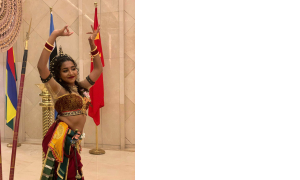
Oct 22 2024.
views 396Posing dramatically with a dazzling smile plastered on her face, a flashing spotlight illuminating the beads of sweat formed on her forehead, bejewelled eyes mirroring the satisfaction from a roaring audience, she gasps breathlessly from the rushing exhilaration after a star performance.
But as the curtains close and dazzling costumes come off, performers are left to face a concerning reality. Behind the glitz and glamour, Tarja De Silva unveils the striking affairs rooted in the performing arts industry.
The Cost of Passion
Reflecting on her decision to speak out about these issues, Tarja explains, “I never really mentioned it when I was young, but when I was asked about the challenges in this field in recent interviews, I was compelled to bring up the issue of payment structures and how performers are paid unfairly compared to other artists. This shortcoming has settled itself in the industry as a norm since many people have put up with it and continue to do so and I believe it is an issue to be brought to attention”.
Tarja has encountered discouragement along her journey, both from individuals and the broader industry. While she hesitates to point fingers directly, she acknowledges the common experience of dancers being "used as background artists or merely to fill a stage. It’s rare for just one or two dancers to perform alone, and even then, the expectations are high – you need to look a certain way, or dance for hours on end." She also notes how some dancers are willing to perform for lower fees, undercutting the value of their peers. "I learned early on that you have to make your mark and be firm about what you charge if you want people to take you seriously."

“It seems to be a cultural state of mind,” Tarja shared, addressing the broader societal view of performing arts careers. “Looking back at various generations, we have always been fed the rhetoric that the most recognised and valued professions are doctors, lawyers or engineers because - to be fair - they provide a stable career. Our education systems push the youth to divert from the Arts and focus on logic-based subjects such as mathematics or science. The seed is placed in our young minds to believe that an artist or anyone who considers themselves one, is of lesser importance. I was also told that I wouldn’t be able to make a successful career by being an artist and I feel that it is an incorrect narrative being relayed that results in a lack of respect for these types of careers”.
As for advice to aspiring performers, Tarja doesn’t sugarcoat the reality of the field. “Life is brutal. You will face rejection very many times before you succeed, but this is true for any field. Rather than fighting for acceptance and respect from a society that is already tarnished with a different opinion, focus on your craft, and relentlessly do what you want to do to make yourself happy. If there aren't many opportunities, let's try to create them! As I mentioned before, the responsibility lies in the future artists and in the future educators as well”.
Shifting Perspectives: The Role of Education in Supporting the Arts
Tarja also spoke about the power of arts education, sharing, “I believe performing arts schools are an amazing platform for young artists to come together and work on their skills - be it theatre, singing, music or dance. It’s brilliant! We should build more outlets where future artists can cultivate and display their skills and I urge schools and institutions of all kinds to do better in this regard. Let's educate our children and encourage them to move towards creativity and expression.”
Expanding on the power of arts education, we reached out to Colombo Dream School - a new performing arts and creative arts school that looks to support aspiring artists of all ages to discover their passions and expand their potential. Providing workshops from dancing to dramatic and theatre expression, the school offers a space for artistic expression to thrive with no limit. Colombo Dream School’s Co-founder and Director of Programmes Naveed Rozais commented on the drive behind the institute and what it stands for. “We founded Colombo Dream School (CDS) because we believe in the power of the creative arts. The arts engage all of you; body and soul. It builds creativity, problem-solving and critical thinking. That said, the arts have always been undervalued, and that is what we are looking to fix. The world we live in is changing. Being in touch with our creative side, being able to be comfortable with ourselves, and being able to think on our feet are quickly becoming the skills that will set us apart from the rest, and this is why it is crucial to instil these skills in the younger generation.”

However, because the arts have been undervalued for so long, building a career in the arts is incredibly difficult, even abroad, and this leads parents to discourage their children from pursuing the arts, even if they are talented. Naveed pointed out that this becomes a cycle. “How can the arts grow if people are unwilling to invest in it, whether by investing in the arts themselves or letting their children be artists?”, he questioned, adding, that CDS looks to break the cycle of the undervaluing of the arts and build a better foundation for performing and creative arts in Sri Lanka by encouraging children and young adults (and their parents) to immerse themselves in the arts in a non-traditional environment.
“While we do have a more traditional year-long programme for performing arts in partnership with Trinity College London, we also focus heavily on doing sets of short skill-driven workshops for all age groups which are designed to give people a taste of what it’s like to follow a performing art skill – to throw themselves into theatre, to be behind the camera, or to make a blank page their personal canvas – in a flexible environment that allows them to learn both soft and hard skills of art with no larger expectation than simply learning and having fun doing it. It’s not an easy task because people haven’t opened their eyes to the value of the arts yet. But the creative industries are responsible for everything we enjoy, for everything that makes being human fun. If we don’t see the value of it now and encourage the younger generation to immerse themselves in it, to be able to live lives of artistic fulfilment, what kind of a world are we really building for them?”
A Mental and Physical Shift in Valuing the Arts
Paving the way for the younger generation to explore creative paths shows those seeking to break away from traditional careers that there is still hope. Sandithi Illeperuma feels fortunate to have the support of her family as she has dedicated over 10 years to Kandyan and traditional dance, an art form she plans to continue honing. Her experience in dance has also opened doors for her to explore other creative outlets, including painting and majoring in fashion design.

“The Sri Lankan culture and stereotypes brainwashed me into thinking that unless you were a doctor or an engineer, you were a failure in life. That is not true, they’re not always the most successful people. Despite everything else I heard, I would have been miserable if I had considered not going down a creative path in terms of my career. Art, in a way, is the best representation of myself. Whether it’s performing as a dancer, where it's just the music, myself and the beats, or painting which helps to keep me centred. It gives me peace.”
As the arts continue to evolve, it becomes increasingly clear that the responsibility for their future lies heavily in the hands of educators, parents, and both the next generation of performing artists and those who have paved the way. Tarja emphasises the need for a shift in mindset, stating, “I would like to see a shift in mindset where educators, teachers, and parents allow their children or the youth to follow their passion in dance or acting, whatever it may be, and support it wholeheartedly. Hold back from pushing them into careers they don’t show an interest in and give them the opportunity to explore other avenues.” She further advocates for the establishment of more venues, saying, “I would also like to see more establishments that offer performers the opportunity to display and hone their talents, and that responsibility lies in all those associates I first mentioned.”
Tarja's photograph credits: Malaka MP
0 Comments